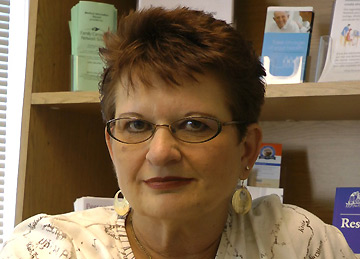Daphne

Cared for parents
Age at interview: 60
Age at start of caregiving: 58
Daphne is 60 years old, lives with her husband, and was a nurse in her professional life. She cared for her father for two to three years from the time he had a heart attack at 89 years old until he died recently. Daphne describes her father as a proud World War II war veteran. Daphne’s home is in a different province from her parents, who remained on their family farm into their retirement.
Daphne became a caregiver rather suddenly when she went to visit her parents (she was living in another province) following a call from her brother letting her know that her father had fallen ill. When she arrived, she found both parents in hospital and there was much confusion about what had happened to her father, while her mother was recovering from pneumonia. Daphne didn’t return home immediately, but stayed for two and a half years with her parents on the farm to support them (returning home now and then). Her father remained in-hospital for about a year, and then had different nursing home arrangements due to his deteriorating heart condition and other problems, until he finally received a place in a veteran’s hospital – where the care and professional culture was very much more satisfactory. Her father died there after several months. Although Daphne’s mother was at home after her illness, she was not able to help with her husband’s care, and Daphne helped to support her as well.
Daphne was very angry and upset about the care her father received in the first hospital he was admitted to. She describes the care there as woefully inadequate and downright abusive. She fought very hard as her father’s advocate to ensure appropriate care, and after his death was left feeling very frustrated and disappointed that the healthcare system failed someone who had given so much for his country as a war veteran.
Although Daphne found caregiving for her father very stressful and because of the situation she was often angry and frustrated, she did enjoy caring for her father as it brought her closer to him and it was wonderful to feel so useful during the last years of his life. Daphne found great support from family, friends and a counsellor who helped her cope through this period; with her expertise as a professional nurse, she was a strong advocate for her father’s care and was not afraid to stand up to the healthcare professionals that she felt were not meeting basic quality standards of care. She believes that had he received timely and better care, he would have had a better quality of life for his remaining years. She would like governments and those working in the healthcare system to pay more attention to caregivers and to improve the quality of care provided to sick older people in hospitals.
Daphne feels strongly that caregivers need to advocate for their loved ones to ensure that they receive the best possible care. She encourages other caregivers to find support for themselves to help cope with all the challenges that caregiving throws your way. Daphne feels stronger and wiser as a result of her experience; she is working hard to focus on the lighter and positive side of life.
More content
- When care changes over time – DaphneWhen her father had a congested cough, Daphne realized he was dying.
- Personal growth and transformation – DaphneDaphne learned that making a mistake is in fact a learning experience.
- Legal issues – DaphneDaphne wanted to sue the hospital for their poor quality of care but decided not to do it as it would take too much energy and agony.
- Hospitals and facilities – DaphneIn hindsight, Daphne would have transferred her father out of the hospital where he received unsatisfactory care.
- Becoming a caregiver – DaphneDaphne flew out to see what was happening and discovered that both her parents had been admitted to the hospital